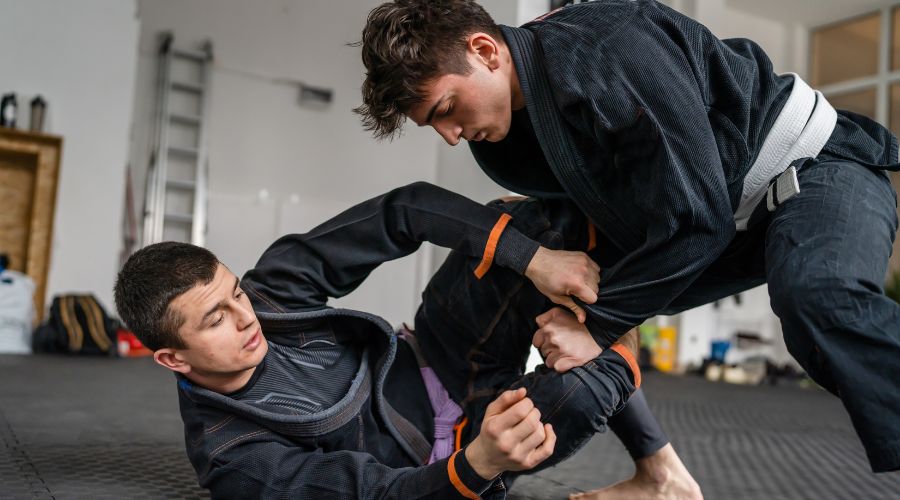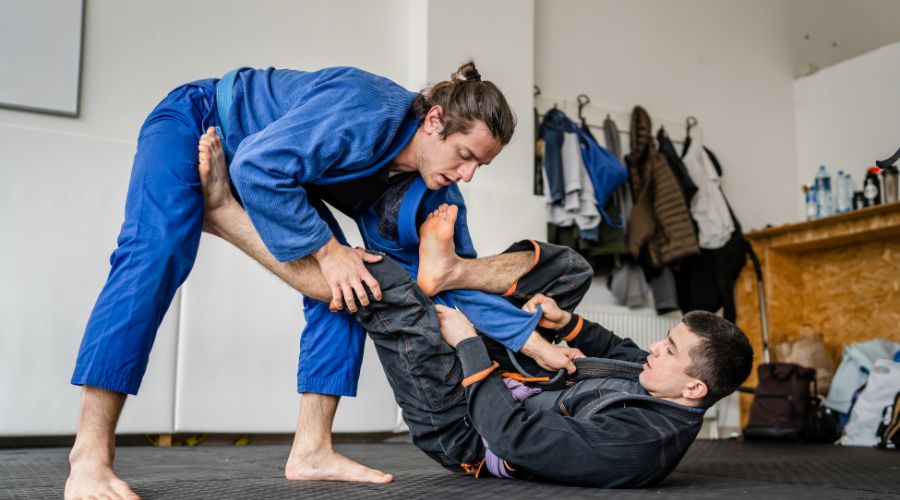We live in a time where we get to choose what to do with a good portion of our time. Out of the many hobbies and pastimes, martial arts have always had one of the best bang for buck value, and one of the most common martial arts today is BJJ. But is it worth training it?
Training BJJ is worth the time, effort, and money invested for most people. But ultimately, it depends on everyone’s goals, priorities, and time and money availability. While BJJ is for everyone, not everyone is for BJJ.
Jiu-jitsu brings immense tangible and intangible benefits for everyone who spends enough time training, but these benefits also come at a price you must be willing to pay. Is the result worth it? It will depend from person to person, and this article will make your decision easier.
Is It Worth To Learn BJJ
The answer is a huge, resounding yes. But I know you want more detail and convincing. I could make a 20-page list of why BJJ is so good, but a few key points should be enough to cover the main elements to convince you of its worth.
Self-Defense Skills And Confidence
Fighting is important. Especially if you are a normally functioning man, violence and conflict are deep inside you, regardless of how much some try to convince themselves this is untrue.
If it were people like March Zuckerberg, Russell Brand, Tom Hardy, and many other celebrities, obscenely wealthy people would never even break a sweat in the gym, let alone compete on the mats.
Having the confidence to handle yourself in violent situations stemming from being in them, albeit controlled, is often more important than the actual fighting skills. But confidence alone is not always enough, and BJJ has no shortage of effective real fighting skills.
The whole premise of this martial art is to learn techniques that can be used in live sparring, competitions, and self-defense, so each move you make is constantly pressure-tested.
BJJ is one of the few styles where you can spar at full power frequently, and it has proven to be one of the best self-defense systems.
Of course, BJJ is not perfect and has some gaps, but some gaps are much better than the vast gaping holes most other martial arts have in this domain.
Fitness

Do I need to explain why being fit is good for your health? I didn’t think so. But instead, I will share how BJJ will help you get there. Grappling won’t get you big and swole, but it will build strength, mobility, agility, body awareness, and great cardio.
Why suffer through a soul-crushingly boring 60-minute treadmill run when you can spend the same time wrestling with people and build much more than cardiovascular endurance?
Stress Relief
In the modern world, mental health is as suffering and as important as physical health. I have different hobbies and have tried a lot of practices to clear my mind, but to this day, nothing is as effective as martial arts.
When someone is trying to choke you, even if you both know it’s a game, some colleagues’ remarks at work feel not simply unimportant but nonexistent.
The combination of physical exertion with the intricate problem-solving nature of jiu-jitsu leaves no space for anything else in the mind. Martial arts, especially sparring, is a form of action meditation where nothing else matters but this moment.
Regardless of how hard life is, even though it’s often brutal, I guarantee the gym will always offer solace and a way to rest from worldly troubles in a way precious few other things can.
Mental Toughness
It’s no coincidence books like “The Obstacle is the Way” have become so popular. Life is full of suffering, and you must overcome it. BJJ and martial arts, in general, are among the best pursuits that build mental fortitude in a way no other time in the modern world can.
Jiu-jitsu is a great metaphor for life—you will get smashed, beaten, and your ego broken. Some people will be faster, stronger, and better than you just because they are.
You will learn to overcome physical hardships, ego checks, plateaus, and injuries, but you will also learn hard work always pays off.
These are invaluable lessons you can and will carry into everyday life. The only other ways to develop such skills in real life are not living conditions many would voluntarily choose.
Safety And Accessibility

The previous benefits, including self-defense skills, building physical and mental toughness, and being an incredible stress relief instrument, are not unique to BJJ but to many martial arts like kickboxing, Muay Thai, MMA, Judo, etc.
What makes jiu-jitsu so popular and what brought about the incredible speed of its rise is its safety and accessibility to all kinds of people.
While the gentle art moniker quickly dissolves the first few times someone death squeezes your neck or a 260-pound man S-mounts you, jiu-jitsu is still much safer and less traumatic than striking martial arts and even judo and wrestling.
Not getting hit in the head is a priority for many people, so they choose grappling instead of striking.
On top of that, jiu-jitsu is considered and looks more “civilized” than striking sports like boxing and kickboxing. While I can argue on the topic, the image remains strong among the general population, and for some professions, this is important.
Accessibility is another crucial factor in BJJ’s popularity. BJJ is for everyone—you can be young, middle-aged, old, fat, skinny, jacked, stiff as a board, flexible as a gymnast, tall, short, male or female, and still practice and enjoy jiu-jitsu.
The huge variety of possible techniques and the countless tactics and strategies means everyone can find their own game and be effective.
The same cannot be said to the same extent for other martial arts, which require more speed, power, or agility. There are countless examples of people who begin training in BJJ and become addicted later in life, as well as people with disabilities.
Community
Enduring hardships with other people creates unbreakable bonds with them. This is why soldiers, firefighters, athletes, and other similar groups form the tightest communities. From my experience, the BJJ community is one of the most welcoming you can be.
In the gym, you will make friends you know you can always trust and rely on. You will make contact with people from all walks of life, including many you would never meet otherwise.
All of these benefits are too good to be true, and if this is the case, anyone in the world would be training in BJJ. While I strongly endorse this notion, like with everything in life, there is a price to pay.
Is BJJ Worth The Injuries

I already noted how safe BJJ is as a martial art, but this is only compared to other combat sports involving sparring and live drilling. Jiu-jitsu is still quite traumatic, and your body will hurt in every possible spot at one time or another.
We may train safely, but the technique’s end goal is to hurt the opponent, and the whole rolling around takes a toll on the body.
According to studies, BJJ has fewer injuries than wrestling, Taekwondo, Judo, and MMA, which supports the notion it’s safer, but if you want to reap all the benefits, be willing to suffer through a lot of soreness, stiffness, and some inevitable injuries. Most are minor and orthopedic, but the fingers, hands, knees, and shoulders will feel all the training.
There are ways to mitigate the risks, like tapping early every time (which will mean you are constantly submitted, so it’s not realistically going to happen) and being aware of dangerous positions. You can also do extra-prehab exercises and strength and mobility work. But this is also extra work you must do.
All of the pain and injuries are well worth it, and judging by the number of people who have trained for years, they feel the same way. But this is subjective to everyone and their outlook on life. Every competitive sport inevitably leads to injuries, even for hobbyists, and BJJ is no different.
Objectively speaking, if your goal is only to work out for health and fitness, there are other safer and less traumatic ways of doing it.
Why Is BJJ So Expensive
Brazilian jiu-jitsu, in some places, is also hard on the wallet, which has led people away from the gym. Training fees are often expensive because a gym has a lot of expenses: rent, bills, salaries, equipment, and so on.
Then, the instructors need to make a profit and make a living, which sums up to a hefty sum at the end of each month practitioners need to pay.
Long-term payments may be better than paying for each session if you want to make it a better investment. But then, if you cannot train during this period, the money will be wasted.
But gym fees are not the only expense. You need gis, rash guards, spats, and mouthguards. Gi’s are especially expensive, and one pair is not enough if you train more frequently. If you become serious about it, you will want to eat better, and sadly, eating healthy is not cheap.
Then, if you go even further and start competing, things become even more difficult because you need to train, eat, buy supplements, eventually travel, and pay an entry fee.
So, aside from the blood, sweat, and tears you must pay, BJJ also has a solid price in real money.
Summary
Having confidence, good physical health, fighting skills, a community of friends you rely on, and daily access to the best mental therapy on the planet sounds like a bargain to me at any price.
BJJ will get you all of those and more, but only if you are willing to put in the time, effort, focus, and money and endure pain, injuries, and countless ego deaths. Is all of this worth it? I will leave the final decision up to you.
